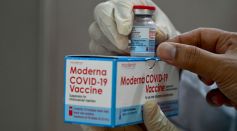MEDICINE & HEALTH
Metal Toxicity in Humans: Scientists Discover Link Between Metal Production and Exposure to Lead Which Are Usually Present in Electronic Devices

Booster Shots and School Openings: Barton County Commission Recommends COVID-19 Health Guidelines

Fluo Labs, Drug-Free Seasonal Allergy Treatment Developer, Announce Partnership with a Global Life Sciences Company

Southern Serbian Caveman Who’s Been Practicing ‘Social Distancing’ for 20 Years Emerges from Hideout to Get COVID-19 Vaccine

COVID-19 Delta Variant Spreads Fast; More Travelers From Abroad Want Another Vaccine Booster Shot in the US
Plasmodium Falciparum Dubbed Most Deadly Malaria Parasite Regulates Its Reaction to High Fever, Here's How It Happens

Socioeconomic Status Not Associated With Body Dissatisfaction Predominant in Teens, Young Adults

How To Sleep Better: Neuropsychologist Shares Tips on Snoozing Back After Waking up at 3 Am

Drugs to Suppress Diabetes Found to Decrease Development of Alzheimer's Disease
'Gut Feeling' Suddenly Made Sense: Enteric Nervous System Explains Why Gastrointestinal Tract Should Be Our 'First Brain'

Congenital Heart Disease and Autism in Children Possibly Caused by Sperm Mutation in Older Men

Understanding Cyber Dating Violence: Online Dating Abuse Linked to Human Evolution

ADHD in Teens Linked to Smoking: What's Triggering These Youngsters to Smoke More Frequently and How to Stop Them From Doing So?
Heart Failure Treatment: New Research Shows How Protein May Help Fix This Condition
Most Popular

Blood Moon to Appear During Total Lunar Eclipse on March 3, 2026

NASA Reveals an Astronaut Was Medically Evacuated From the ISS for the First Time After a Non-Emergency Health Scare

The Science of Aging: What Cellular Aging and Telomeres Reveal About Human Longevity

How Volcanoes Destroy, Build Land, and Shape Earth's Surface and Climate




